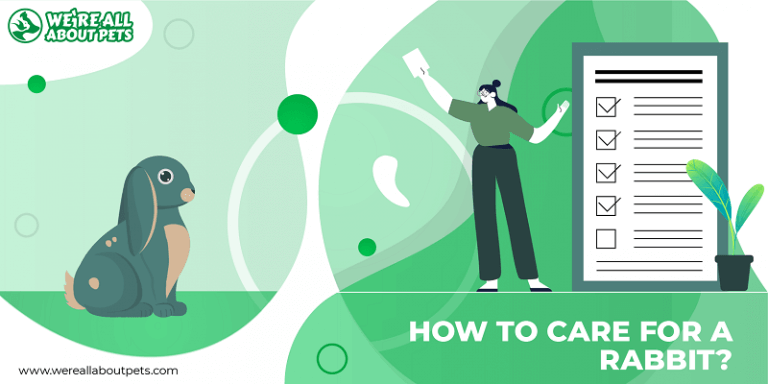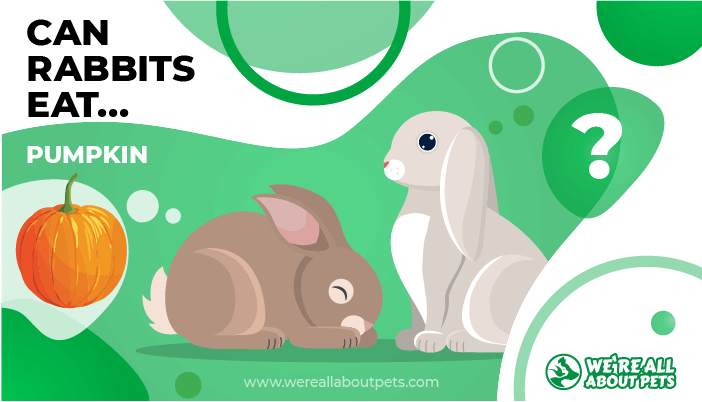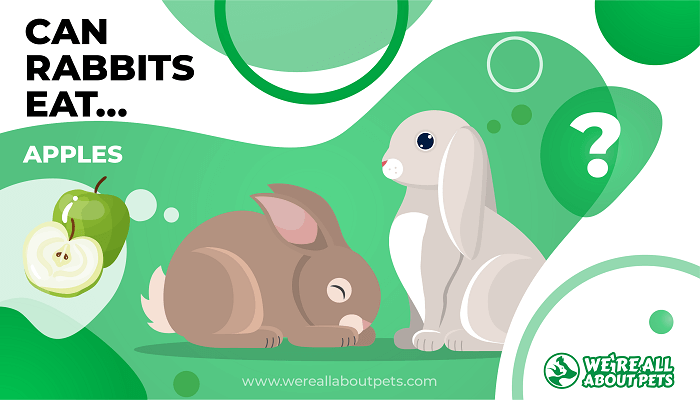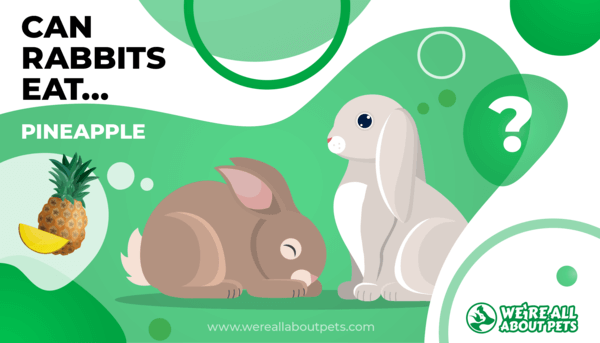How To Care For A Rabbit?
This page contains affiliate links. We may earn money or products from the companies mentioned in this post through our independently chosen links, which earn us a commission. Learn More
General Stats:
- Pet Type: Small animal
- Size: 1.5 to 20 pounds
- Diet: Herbivore
- Lifespan: 8 to 12 years
With their big ears and wiggly noses, rabbits are easily one of the most adorable pets out there. As cute and cuddly as they may be, rabbits are also a big responsibility.
Without proper care and a healthy diet, your pet rabbit may not reach his full lifespan and could very well develop serious health problems.
Before bringing home a new pet, it’s important to do your research. Only when you are sure you understand a pet rabbit’s care requirements and you know you can meet them should you bring a new pet rabbit into your home and into your life.
Here’s what you need to know about caring for rabbits.
Habitat Setup For Rabbits
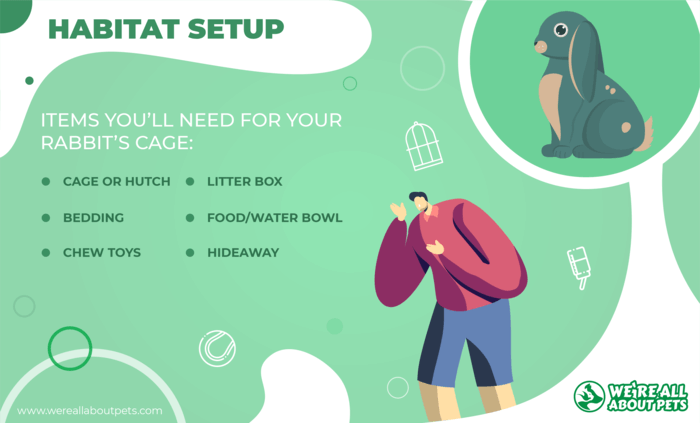
When it comes to pet rabbits, there are many different breeds. It’s important to know what type of rabbit you plan to keep before you choose the best rabbit cage.
You’ll also need to consider whether you plan to keep your rabbit indoors in a cage or outdoors in a hutch.
Rabbits require a good deal of space and exercise, so many rabbit owners make their pet bunny a “house rabbit.” They provide a cage and litter box but give the rabbit ample time to explore the home. This works best if you don’t have other pets or have a room you can designate for your rabbit’s use.
Here are some of the items you’ll need for your rabbit’s cage:
- Cage or Hutch – When it comes to cages and hutches, the bigger the better. The size of the cage will be determined by the size of your rabbit and how many you keep. Choose sturdy materials and avoid wire-bottom cages because they can irritate your rabbit’s feet.
- Bedding – Even if you litter train your rabbit you should put down some type of bedding, even if it is just fleece. Look for non-toxic materials that absorb odor and liquid.
- Chew Toys – Your rabbit’s teeth grow continuously, so chew toys are important to keep them filed down. Natural fruit wood is a good material for chew toys.
- Litter Box – Litter training a rabbit is easy but be careful what materials you use. Be sure not to use cat litter because it can be dusty and harmful to your pet. Look for materials made from recycled ingredients like paper or wood shavings (avoid pine and cedar).
- Hideaway – Because rabbits are prey animals, they like to feel secure. Provide your rabbit with a few places to hide – something as simple as a cardboard box works well.
- Food and Water – Choose sturdy food bowls that won’t tip over or break. Some rabbits will drink from a water bowl, but many rabbit owners prefer water bottles.
In addition to these basics to set up your rabbit’s habitat, you should also think about his grooming needs. Depending what type of rabbit you get, you may need to brush him regularly to prevent hairballs and mats. Nail clippers are a must for rabbit owners as well.
Many rabbit owners let their rabbits roam freely in the house which is great for exercise and mental stimulation. Just be careful about potential hazards in the home such as toxic house plants like aloe, ivy, lilies, azalea, and more.
Also Read: The Cost Of Owning A Rabbit
Rabbit Diet

You may already know that rabbits are herbivores, but you may not realize just how unique their digestive system is.
When your rabbit eats food, it travels down the esophagus into the stomach and then into the small intestine where nutrients are absorbed. From there, however, it is sent to a different place depending whether the fiber is digestible or indigestible.
Digestible fiber still contains nutrients, so it gets diverted to the caecum to be processed. Indigestible fiber passes through the colon where it is formed into round pellets and passed as waste.
Here are some quick facts about the ideal rabbit diet:
- A healthy diet for rabbits is high in fiber with moderate protein but low in both fat and sugar.
- Fresh grass hay like timothy hay should make up the majority of your rabbit’s diet – provide unlimited access to fresh hay for adults 6 months and older.
- Alfalfa hay should only be given to rabbits 6 months and under because it is high in protein – adult rabbits need more fiber than protein.
- Fresh vegetables like leafy greens (ex: kale, romaine lettuce, dandelion greens) should be offered daily – provide 2 to 4 cups per rabbit and vary the type of veggies from day to day.
- Small amounts of fresh fruit (low in sugar) and fresh herbs (like parsley and cilantro) can be offered a few times a week.
- Include commercial rabbit pellets in your pet’s daily diet – choose timothy-based pellets and offer about ¼ cup per 5 pounds of body weight.
In addition to food, be sure to provide your pet with unlimited access to fresh water as well. A small pet water bottle is perfectly adequate. Just be sure to clean it and refill it on a daily basis.
Also Read: What Do Rabbits Eat?
Rabbit Veterinary Care
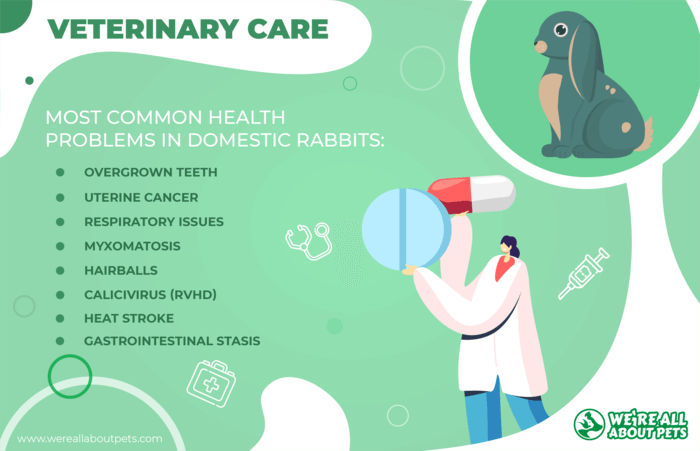
The quality of your rabbit’s diet plays a key role in supporting his long-term health and well-being, but you should still be aware of potential health problems.
Understanding the issues most likely to affect your new pet and being able to identify the symptoms ensures that you’ll be able to seek veterinary care as soon as you notice a problem so your pet has a good chance of recovery.
Here are some of the most common health problems in domestic rabbits:
- Overgrown teeth
- Uterine cancer
- Respiratory issues
- Myxomatosis
- Hairballs
- Calicivirus (RVHD)
- Heat stroke
- Gastrointestinal stasis
Not all veterinarians are trained to care for rabbits, so you may want to find an exotics vet or a rabbit vet in your area before bringing your new pet home for the first time.
Take your pet bunny to the vet within a few weeks of getting him to establish a baseline for wellness. Down the line, if you notice signs of illness, you can take your rabbit to the vet immediately to see what’s going on.
With proper rabbit care and a nutritious diet, your rabbit should stay perfectly healthy but it’s still a good idea to take him in for annual checkups. Rabbits require annual vaccinations from 10 weeks of age to protect against myxomatosis and Rabbit Viral Hemorrhagic Disease (RVHD).
Some rabbit owners consider pet insurance to help offset the cost of vet checkups and other treatments, but it may not always be worth it. Many plans don’t cover pets other than dogs and cats, plus you may spend more in monthly premiums than you would to pay for the treatment itself.
Consider the pros and cons of pet insurance versus saving the monthly premium in case of emergencies.
Rabbit Fun Facts
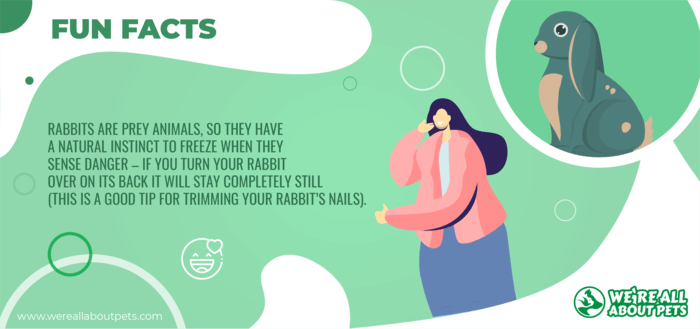
- Rabbits are prey animals, so they have a natural instinct to freeze when they sense danger – if you turn your rabbit over on its back it will stay completely still (this is a good tip for trimming your rabbit’s nails).
- The rabbit can be a loving pet and they are social animals, so make sure to spend plenty of time bonding with your pet bunny. Rabbits also have the capacity to bond closely with other rabbits, so consider adopting a bonded pair or talk to a rabbit rescue about finding a friend for your pet rabbit.
- Though it is commonly assumed that rabbits are nocturnal, they are actually crepuscular which means they are most active in the twilight hours near dawn and dusk. Many rabbits will sleep during the day, however, and become more active at night.
- Rabbits breed very quickly because they have short gestation periods of just 31 to 33 days. A single female rabbit could have as many as 12 litters per year with as many as 14 kits in each litter. This is why spaying and neutering is so important for pet rabbits.
- Your rabbit has about 28 teeth including four incisors, 6 upper and 4 lower premolars, and 6 upper and 6 lower molars. Your rabbit’s teeth grow continuously and may need to be trimmed occasionally.
- Rabbits can become surprisingly territorial, so keep this in mind if you have other pets. Your rabbit needs plenty of space and may decide on specific locations where he likes to sleep, eat, and do his business.
- Pet rabbits require a significant amount of socialization as well as mental and physical stimulation. Rabbits like to play with toys and can even be trained to some degree.
Rabbits make wonderful pets, but they can be a big responsibility as well. If you want a rabbit that is already raised and litter trained, check with local rescue groups before going to the pet store.
Be sure to do your research as well to ensure that you can provide for your new rabbit in every way necessary.
Frequently Asked Questions
How long do rabbits live?
The average lifespan for a pet rabbit is about 8 to 12 years. Domestic rabbits live much longer than their wild counterparts which only live an average of 1 to 2 years.
How much do rabbits cost?
The cost to purchase and keep a rabbit varies depending on a variety of factors. Rabbits in pet stores often cost under $50 but you could easily spend more if you’re looking for a specific breed. A good rabbit cage or hutch could cost as much as $200 and you’ll have to factor in the cost of supplies, food, and bedding as well. In terms of the most significant upfront costs for pet rabbits, consider the cost of the cage and the vet fees for spaying or neutering your rabbit. Spaying female rabbits is more expensive than neutering male rabbits – plan to spend $50 to $200.
How big do rabbits get?
There are many different rabbit breeds and each grow to different sizes. Small breeds like Netherland dwarfs may only weigh 2 to 3 pounds but large breeds like the Flemish Giant can weigh 15 to 20 pounds.
What do rabbits eat?
Rabbits are herbivores by nature, so they feed on plant material. Fresh grass hay like timothy hay should be the foundation for your rabbit’s diet, supplemented with leafy greens and other veggies.
Are rabbits good pets?
Generally speaking, rabbits are gentle pets that bond closely with their owners and they can be quite entertaining. There are some challenges when it comes to their size and exercise requirements, but with proper care and litter training they are great pets.
Are rabbits messy?
All pets are at least a little bit messy, but you can minimize the mess with your rabbit by litter training him. Training your rabbit to use a little box negates the need to use bedding and you can let your rabbit roam free without worrying about too much mess.
Where do rabbits come from?
Wild rabbits can be found all over the world. Domestic rabbits are bred from wild rabbits and there are many different breeds to choose from.
Do rabbits bite?
Though most rabbits are calm and friendly, some have a tendency to bite. In most cases, a rabbit will only bite when stressed or afraid, but some rabbits simply like to nibble.
Do rabbits sleep?
Though it is commonly assumed that rabbits are nocturnal, they are actually crepuscular. This means that they are most active in the twilight hours near dawn and dusk.
How long are rabbits pregnant for?
Rabbits are known for being prolific breeders which makes sense considering they have a very short gestation period of just 31 to 33 days. A single rabbit could potentially have 11 to 12 litters per year and the average litter has about 6 kits, though could have as many as 14.






